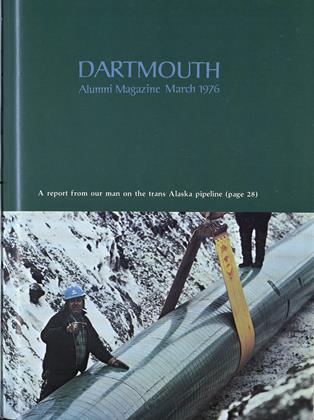The title of the book is challenging. Why "existential" when engineering and existentialism appear to have nothing to do with each other? This "speculative essay" suggests that the existentialist may have trouble if he views the engineer as an antagonist whose analytical methods and pragmatic approach to life must always be "desensitizing and soul deadening... antiexistential."
If on page 4 we have references to the new marvels of transportation, communication, construction, sources of power, new materials, and conveniences of daily life, on page 5 we read how engineers are hailed as heroes by Kipling, Zane Grey, Ronald Colman, Jules Verne, H. G. Wells, Walt Whitman, Carl Sandburg, Joaquin Miller, Robert Louis Stevenson, and Henry Adams.
And then disenchantment sets in. In Berkeley 'he placard: "I am a human being - Please do not fold, spindle, or multilate." In Paris the slogan printed on the wall: "Death to the Technocrats." In the chapter "Decline and Fall" the last sentence runs: "The 'Can Do' boast of World War II years now seems as pathetic as a battered landing barge rusting on a Normandy beach."
The second half of the book treats "antitechnology," the doctrine that condemns tech- nology as the devil incarnate. Florman stands up strongly and sensibly against the excesses shown in the extravagant and anguished moans of Jacques Ellul, Lewis Mumford, Rene Dubos, Charles A. Reich, and Theodore Roszak.
Finally with the help of poetry and prose of the mo'dern era Florman encourages engineers to reaffirm their innate love for the machine because of its intrinsic beauty, for surely the machine is indeed a marvel of dynamic elegance. Breathes there an engineer with soul so dead as to be utterly unable to respond sympathetically to the power felt by the pilot of Saint-Exupery's Night Flight?
He passed his fingers along a steel rib and felt the stream of life that flowed in it; the metal did not vibrate, yet it was alive. The engine's five-hundred horse-power bred in its texture a very gentle current, fraying its ice-cold rind into a velvety bloom. Once again the pilot in full flight experienced neither giddiness nor any thrill; only the mystery of metal turned to living flesh.
Among acknowledgments Florman writes: "I also owe a debt of gratitude to the Thayer School of Engineering at Dartmouth College, where I first learned that engineering is not intended to be isolated from the quest for the good life, and where, through the years, I have observed faculty and students working at the creative and humanistic frontiers of our profession."
THE EXISTENTIAL PLEASURESOF ENGINEERING. BySamuel C. Florman '46. St. Martin's,1975. 160 pp. $7.95.
 View Full Issue
View Full Issue
More From This Issue
-
 Feature
FeatureGod and Man at Dartmouth
March 1976 By DAN NELSON -
 Feature
FeatureWhere Men Moil for Oil
March 1976 By KENT JOHNSON -
 Feature
FeatureA MEMORANDUM
March 1976 By McF. -
 Feature
FeatureOPTIONS & ALTERNATIVES
March 1976 By D.N. -
 Article
ArticlePeople & Places
March 1976 By JACK DEGANGE -
 Class Notes
Class Notes1974
March 1976 By STEPHEN D. SEVERSON, JACK E. THOMAS JR.
JOHN HURD'21
-
 Class Notes
Class Notes1921
April 1976 By HAROLD F. BRAMAN, G. HARRY CHAMBERLAINE, JOHN HURD'21 -
 Books
BooksFIRST PERSON: CONVERSATIONS ON WRITERS AND WRITING WITH GLENWAY WESCOTT, JOHN DOS PASSOS, ROBERT PENN WARREN. JOHN UPDIKE. JOHN BARTH, ROBERT COOVER
March 1974 By JOHN HURD'21 -
 Books
BooksMASTER OF THE COURTS.
May 1974 By JOHN HURD'21 -
 Books
BooksALFRED LORD TENNYSON: IN MEMORIAM. AN AUTHORITATIVE TEXT, BACKGROUND AND SOURCES, CRITICISM.
May 1974 By JOHN HURD'21 -
 Books
BooksThe Eye of the Beholder, Squinting
April 1975 By JOHN HURD'21 -
 Books
BooksFields of Grace
September 1976 By JOHN HURD'21
Books
-
 Books
Books"THE PRESTIGE VALUE OF PUBLIC EMPLOYMENT,"
FEBRUARY 1930 By Charles Leonard Stone -
 Books
BooksPOLITICS IN FRANCE.
MARCH 1969 By FRANCOIS DENOEU -
 Books
BooksGIRAUDOUX, THREE FACES OF DESTINY.
JUNE 1969 By FRANK BROOKS -
 Books
BooksUrban Romantics
April 1976 By NOEL PERRIN -
 Books
BooksSo Much More
NOVEMBER 1984 By Peter Smith -
 Books
BooksPROCEEDINGS OF THE THIRD NEW HAMPSHIRE BANK MANAGEMENT CONFERENCE
October 1942 By William A. Carter '20
JOHN HURD'21
-
 Class Notes
Class Notes1921
April 1976 By HAROLD F. BRAMAN, G. HARRY CHAMBERLAINE, JOHN HURD'21 -
 Books
BooksFIRST PERSON: CONVERSATIONS ON WRITERS AND WRITING WITH GLENWAY WESCOTT, JOHN DOS PASSOS, ROBERT PENN WARREN. JOHN UPDIKE. JOHN BARTH, ROBERT COOVER
March 1974 By JOHN HURD'21 -
 Books
BooksMASTER OF THE COURTS.
May 1974 By JOHN HURD'21

